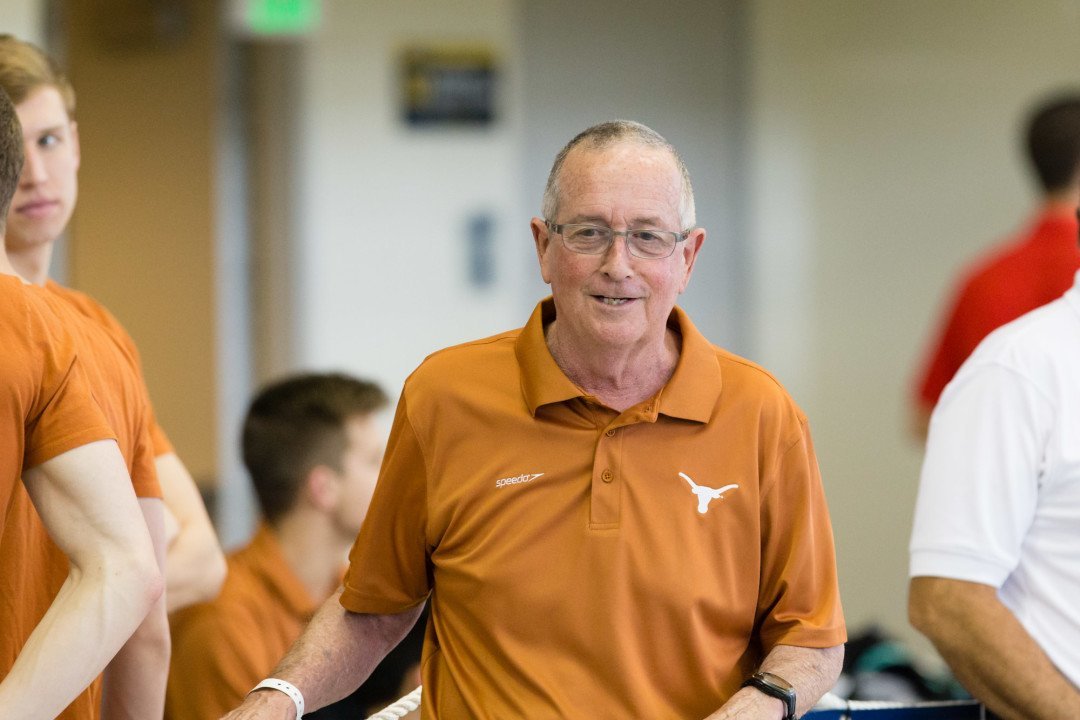Feeling a little stuck with your swimming? Here is some wisdom from one of the GOAT swim coaches of all time, Eddie Reese.
Swimmers in the pursuit of excellence in the water invariably encounter the unexpected plateau or poor swim.
The moments when despite all their hard work, things just aren’t clicking, clacking, or improving.
Maybe it happens in the middle of a training cycle, after what you thought was a great bout of training, or on the heels of a big meet.
So what can swimmers do to push through these inevitable struggles and continue on their path to chlorinated excellence?
Eddie Reese powerfully reminds us what perspective to use when improvement feels harder to grasp than water.
Coach Reese, after all, has more experience than anyone when it comes to developing elite swimmers.
See also: Eddie Reese’s Favorite Sets for Getting Swimmers in Shape
Reese won an NCAA-leading 15 national titles at Texas and placed in the top three at NCAA championships an eye-watering 36 times.
He’s also had tons of success on the international stage, with his swimmers winning nearly 70 Olympic medals over the years.
And he has some excellent wisdom for those stretches during the season when things aren’t clicking or you are working your tail off, but not seeing the results you’re expecting.
Per Reese:
“If you’re not swimming bad at some time of the year, you’re not trying to get better.”
Reese’s advice is a great reminder that improvement and success in the water is not linear.
Just because you work hard every day, do the right things, and mind the details means everything will go smoothly and perfectly.
There will be times when it feels strugglier than you expect.
There are going to be dips, setbacks, and plateaus throughout the season.
Your goal as an elite-minded swimmer is to persevere, analyze where you can improve, and have faith in the work and the process.
How to Bounce Back When You Aren’t Improving
Here are some more tips on how to work through moments when you aren’t swimming as well as you’d expect or like:
Get mental distance.
When you are away from the pool, be out of the pool mentally, too. Dwelling on poor performances in training (or competition) doesn’t help you recharge the proverbial batteries.
Get distance mentally by socializing with friends, catching a movie, and other wise living your life.
Unplugging from the pool doesn’t make you “want it” less or anything like that.
If anything, being able to reset and separate yourself from the intensity and rigor of high-performance swimming when on the dry side of the pool is a competitive advantage.
Don’t worry—the pool will still be there tomorrow.
Focus on different levers of improvement.
Swimmers (naturally) fixate on the clock when measuring themselves for improvement.
Fair enough!
There are lots of other ways to improve, however, that aren’t immediately reflected on the clock.
Things like: Improving your nutrition habits. Better hydration habits. Stretching more. Swim each lap with one fewer stroke. Pulling on the lane rope on odd lengths instead of 100% of the time.
There are lots of different ways to improve in the water and focusing on something different (stroke count, nutrition, sleeping habits) can help build momentum and improve your overall process.
Which, in time, will lead to even more improvement.
Go back to basics.
In moments where I am up to my ears in frustration in the pool, where I can’t catch the water, hit my pace, or my stroke feels like that swim cap that disappears for months under the bleachers at the pool, I go back to basics.
Slow things down and focus on catching a tiny bit more water with each arm pull.
Do lengths of the pool with the absolute best technique possible, regardless of time.
Go back to learn-to-swim basics and do streamlines for distance.
Often, we get caught up in pushing and pushing effort and times in the water.
But when we hit the wall, or things aren’t working, dialing it back and getting back to the fundamentals are a great way to hit reset and get back on track with your swimming.
After all, if you are swimming well, it’s only a matter of time before you start swimming fast.
Wrapping Things Up
It’s easy to get lost in frustration when we aren’t swimming to our standards or the improvement has come to a dead stop.
But getting some perspective, working on improvement in other areas, and revisiting the building blocks of smooth, fast swimming can help you get back on track.
As Reese notes, it’s important to remember that things won’t go perfectly all season long. Poor swimming will happen.
But it’s on you to navigate those downswings in performance with perspective and a healthy process.
Happy swimming!
ABOUT OLIVIER POIRIER-LEROY
Olivier Poirier-Leroy is a former national-level swimmer, author, swim coach, and certified personal trainer. He’s the author of YourSwimBook, a ten-month logbook for competitive swimmers.
 He’s also the author of the recently published mental training workbook for competitive swimmers, Conquer the Pool: The Swimmer’s Ultimate Guide to a High-Performance Mindset.
He’s also the author of the recently published mental training workbook for competitive swimmers, Conquer the Pool: The Swimmer’s Ultimate Guide to a High-Performance Mindset.
It combines sport psychology research, worksheets, anecdotes, and examples of Olympians past and present to give swimmers everything they need to conquer the mental side of the sport.
Ready to take your mindset to the next level in the pool?
Click here to learn more about Conquer the Pool.

Some great advice from the one of the greatest of all time swim coaches of all time
One additional Action – ACCEPTANCE.
At some point, everyone stops improving – by time anyway.
Paul: well said. And, we oughta know, eh?
Good stuff!